
Blood Martyrs of the National Socialist Movement
The Year 1934
Willibald [Willi] Egger
(† 24 July 1934 in Weißenbach b. Liezen)

Willibald [Willi] Egger († 24 July 1934 in Weißenbach b. Liezen) was a Blood martyr of the National Socialist movement.
Willibald Egger from Rottenman was shot dead by a railway auxiliary policeman near the Weißenbach railway bridge.
Erich Schredt
(* 1908, died 25 July 1934 in Vienna)
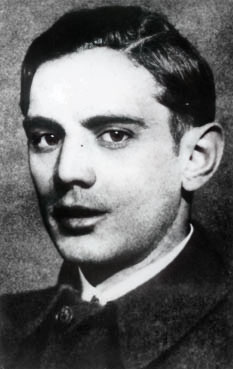
Erich Schredt was a resistance fighter against the Dollfuß regime in German Austria and a Blood martyr of the National Socialist movement who died during the so-called July Putsch.
Between February 1934 and March 1938, the Catholic-conservative camp under Engelbert Dollfuß ruled dictatorially in the German part-state of Austria (Austrofascist Ständestaat). The SPD and the NSDAP were banned and their supporters persecuted. The Austrian broadcasting company, Radio Verkehrs AG (RAVAG), officially became an instrument of authoritarian state leadership.
On 25 July 1934, in the so-called July Putsch, the RAVAG broadcasting facilities in Vienna’s Johannesgasse were occupied by National Socialists disguised as Federal Army soldiers. A statement that Chancellor Dollfuß had resigned was read out. In the ensuing exchange of gunfire, the SS man Erich Schredt was killed.
In Vienna there was a Schredtbrücke and a Schredtgasse until the „liberation“.
Ernst Dreher
(died 26 July 1934 on the Pyhrn Pass)

Ernst Dreher was a resistance fighter against the Dollfuß regime in German Austria and a Blood martyr of the National Socialist movement who died during the so-called July Putsch.
During the so-called July Putsch against the Dollfuß regime in German Austria, fighting broke out between National Socialists and regime troops at the Pyhrn Pass. Ernst Dreher was shot dead in the process.
Wilhelm Fischbacher
(died 26 July 1934 in Pichl-Gleiming)
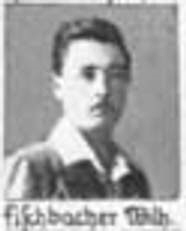
Wilhelm Fischbacher was a resistance fighter against the Dollfuß regime in German Austria and a Blood martyr of the National Socialist movement who died during the so-called July Putsch.
Franz Grünwald
(died 26 July 1934 in Pichl-Gleiming)
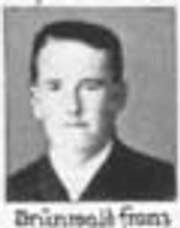
Franz Grünwald was a resistance fighter against the Dollfuß regime in German Austria and a Blood martyr of the National Socialist movement who died during the so-called July Putsch.
Matthias Höflehner
(died 26 July 1934 in Untermandling)
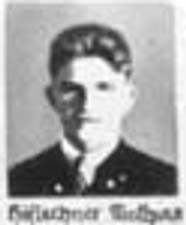
Matthias Höflehner was a resistance fighter against the Dollfuß regime in German Austria and a Blood martyr of the National Socialist movement who died during the so-called July Putsch.
Josef Honomichl
(died 26 July 1934 in Innsbruck)
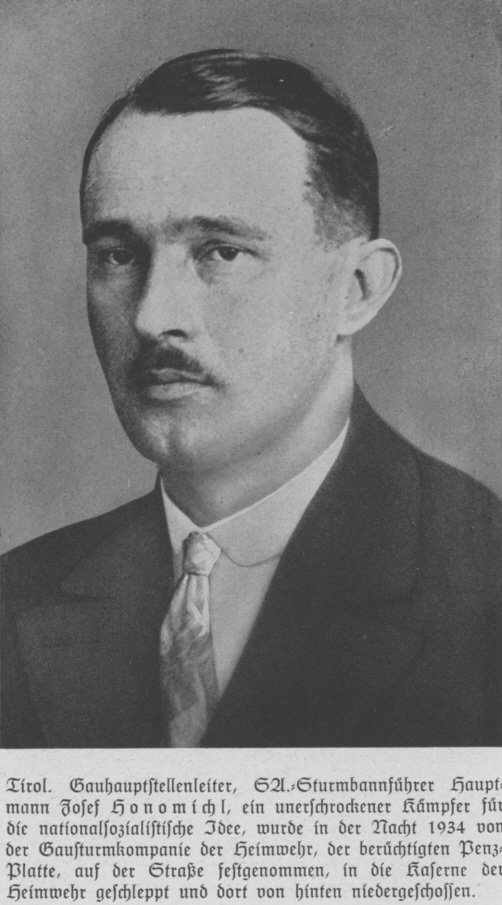
J
Josef Honomichl was a resistance fighter against the Dollfuß regime in German Austria and a Blood martyr of the National Socialist movement. The SA-Sturmbannführer was arrested during the so-called July Putsch and subsequently shot in the back for political reasons.
Johann (Hans) Leidenfrost
(died 26 July 1934 in Schladming)
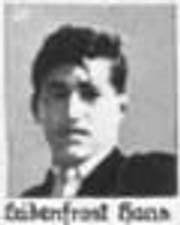
Johann (Hans) Leidenfrost was a resistance fighter against the Dollfuß regime in German Austria and a Blood martyr of the National Socialist movement who died during the so-called July Putsch.
Hubert Miller
(died 26 July 1934 in Schladming)
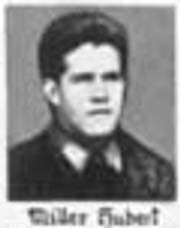
Hubert Miller was a resistance fighter against the Dollfuß regime in German Austria and a Blood martyr of the National Socialist movement who died during the so-called July Putsch.
Max Reiner [Rainer]
(died 26 July 1934 in Messendorf)
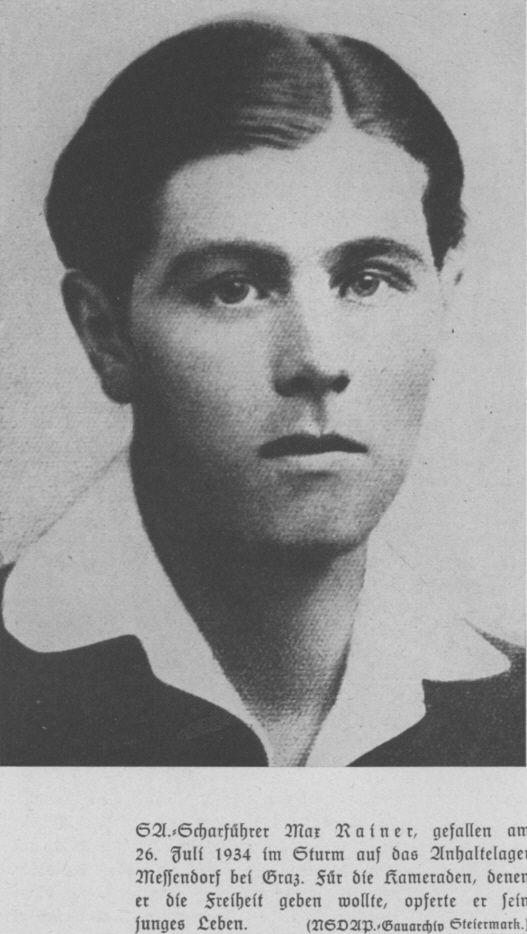
Max Reiner [Rainer] was a resistance fighter against the Dollfuß regime in German Austria and a Blood martyr of the National Socialist movement who died during the so-called July Putsch. During the storming of the detention camp at Messendorf near Graz, the SA Scharführer tried to free his imprisoned comrades and was shot dead in the process.
Gottfried [Friedl] Sekanek
(died 26 July 1934 in Messendorf)
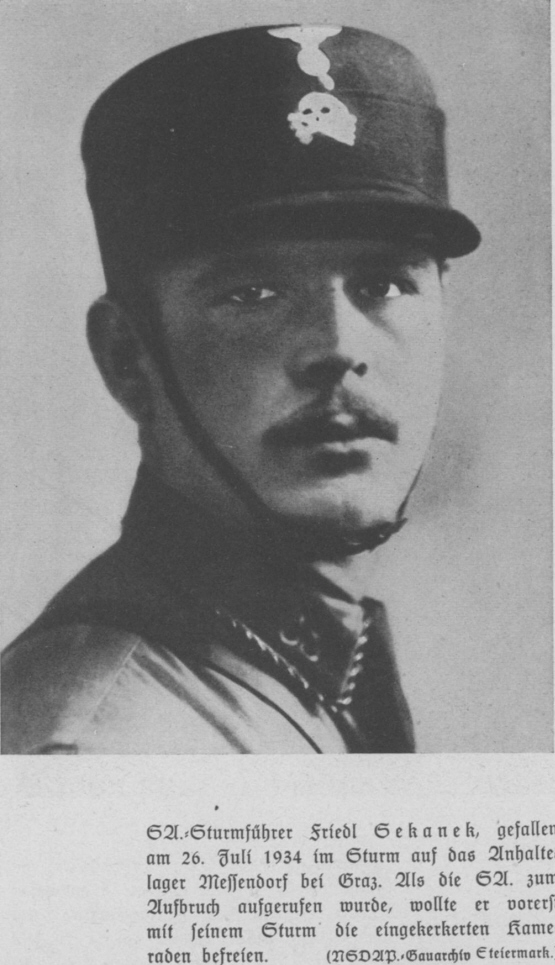
Gottfried [Friedl] Sekanek was a resistance fighter against the Dollfuß regime in German Austria and a Blood martyr of the National Socialist movement who died during the so-called July Putsch. During the storming of the detention camp at Messendorf near Graz, the SA storm leader tried to free his imprisoned comrades and was shot dead in the process.
Adolf Strohmayer
(died 26 July 1934 in Klachau)
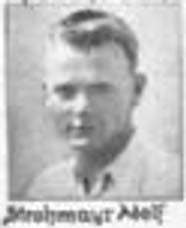
Adolf Strohmayer was a resistance fighter against the Dollfuß regime in German Austria and a Blood martyr of the National Socialist movement who died during the so-called July Putsch.
Fritz Walcher
(died 28 July 1934 in Pichl - Gleiming)
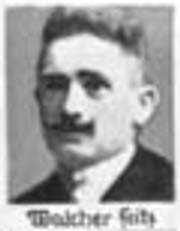
Fritz Walcher was a resistance fighter against the Dollfuß regime in German Austria and a Blood martyr of the National Socialist movement who died during the so-called July Putsch.
Hugo Pliem
(died 30 July 1934 in Mitterndorf, Styria, Austria)

Hugo Pliem was a resistance fighter against the Dollfuß regime in German Austria and a Blood martyr of the National Socialist movement who died during the so-called July Putsch.
In Linz, Pliemstraße was named after him.
Friedrich [Fritz] Wurnig [Wurnick]
(died 1 August 1934 in Innsbruck)

Friedrich [Fritz] Wurnig [Wurnick] was a resistance fighter against the Dollfuß regime in German Austria and a Blood martyr of the National Socialist movement.
Friedrich Wurnig was the leader of a group of the Tyrolean SS. During the July putsch, the Innsbruck police captain Franz Hickl was shot. The death of the particularly hated Franz Hickl, the „most blindly rabid persecutor of all National Socialists“ and „loyal Dollfußknecht“, was to be a kind of prelude and signal for the uprising in Tyrol.
Once before, in late autumn 1933, Friedrich Wurnig was attacked and maltreated because of his German beliefs. At that time he resolutely went to the police commander Hickl to complain and demand the punishment of the perpetrators. Hickl, however, dismissed him with a sneer.
The trial against Otto Planetta and Franz Holzweber began on 30 July. At this speed, it was not possible and probably not desired to conduct the trial with even a modicum of due process of law or a proper defence. Undoubtedly, the Austrofascist regime wanted to demonstrate toughness and spare members of the government who had come under suspicion. Both Planetta and Holzweber were sentenced one day later and executed immediately afterwards. In the course of August, further trials were held and numerous death sentences were passed, eleven of which were carried out. Franz Leeb, Ludwig Maitzen, Josef Hackl, Erich Wohlraab and Ernst Feike were executed; Johann Domes, the leader of the RAVAG occupation was also executed; finally two National Socialists, Franz Saureis and Franz Unterberger, for the mere possession of explosives; furthermore Friedrich Wurnig, Rudolf Erlbacher and Franz Ebner.
Friedrich Wurnig was executed on 1 August 1934. Prior to this, he had been so badly maltreated in custody that the doctor who was called in later diagnosed a severe concussion and a fractured lower jaw. In his last farewell letters, Friedrich Wurnig repeatedly wrote the sentence:
Do not think of me as a murderer.
The current Schweizerstraße in Innsbruck bore his name.
Ernst Feike
(*1911, died 7 August 1934 in Vienna)
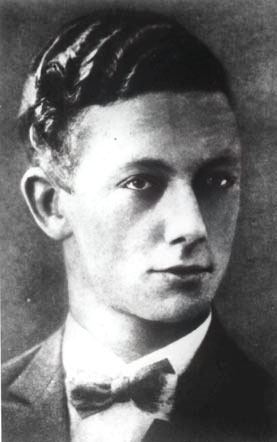
Ernst Feike was a resistance fighter against the Dollfuß regime in German Austria and a Blood martyr of the National Socialist movement who was murdered due to the so-called July Putsch.
Ernst Feike was a sergeant in the Kraftfahr Battalion and took part in the July Putsch of 1934, for which he was sentenced to death and executed. His last words were: Heil Hitler!
The trial against Otto Planetta and Franz Holzweber began on 30 July. At this speed, it was not possible and probably not desired to conduct the trial with even a modicum of due process of law or a proper defence. Undoubtedly, the Austrofascist regime wanted to demonstrate toughness and spare members of the government who had come under suspicion. Both Planetta and Holzweber were sentenced one day later and executed immediately afterwards. In the course of August, further trials were held and numerous death sentences were passed, eleven of which were carried out. Franz Leeb, Ludwig Maitzen, Josef Hackl, Erich Wohlraab and Ernst Feike were executed; Johann Domes, the leader of the RAVAG occupation was also executed; finally two National Socialists, Franz Saureis and Franz Unterberger, for the mere possession of explosives; furthermore Friedrich Wurnig, Rudolf Erlbacher and Franz Ebner.
In Linz, Vienna and in Erfurt, streets bore the name Feikestraße.
Josef Hackl [Hackel]
(*1906, died 13 August 1934 in Vienna)
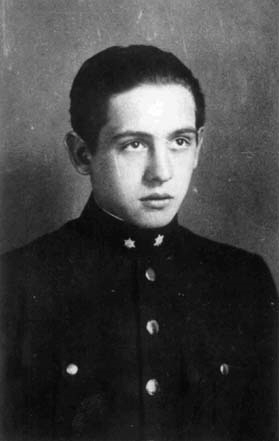
Josef Hackl [Hackel] was a resistance fighter against the Dollfuß regime in German Austria and a Blood martyr of the National Socialist movement who was murdered due to the so-called July Putsch.
The police guard Josef Hackl was involved in the so-called July putsch. After the bloody suppression he was sentenced to death and executed. On the way to the gallows he said to the Catholic clergyman Eduard Köck, who accompanied him:
What have I done that I should die so shamefully? I did no harm to anyone, killed no one, hurt no one, only thought in national socialist terms! His last words were: Heil Hitler!
The trial against Otto Planetta and Franz Holzweber began on 30 July. At this speed, it was not possible and probably not desired to conduct the trial with even a modicum of due process of law or a proper defence. Undoubtedly, the Austrofascist regime wanted to demonstrate toughness and spare members of the government who had come under suspicion. Both Planetta and Holzweber were sentenced one day later and executed immediately afterwards. In the course of August, further trials were held and numerous death sentences were passed, eleven of which were carried out. Franz Leeb, Ludwig Maitzen, Josef Hackl, Erich Wohlraab and Ernst Feike were executed; Johann Domes, the leader of the RAVAG occupation was also executed; finally two National Socialists, Franz Saureis and Franz Unterberger, for the mere possession of explosives; furthermore Friedrich Wurnig, Rudolf Erlbacher and Franz Ebner.
In Linz, Hacklstraße was named after him.
Franz Leeb
(*1902, died 13 August 1934 in Vienna)
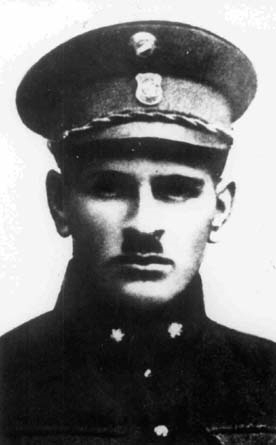
Franz Leeb was a resistance fighter against the Dollfuß regime in German Austria and a Blood martyr of the National Socialist movement who was murdered due to the so-called July Putsch.
The chief constable Franz Leeb was sentenced to death and executed for his participation in the July putsch. His last words were for his wife.
The trial against Otto Planetta and Franz Holzweber began on 30 July. At this speed, it was not possible and probably not desired to conduct the trial with even a modicum of due process of law or a proper defence. Undoubtedly, the Austrofascist regime wanted to demonstrate toughness and spare members of the government who had come under suspicion. Both Planetta and Holzweber were sentenced one day later and executed immediately afterwards. In the course of August, further trials were held and numerous death sentences were passed, eleven of which were carried out. Franz Leeb, Ludwig Maitzen, Josef Hackl, Erich Wohlraab and Ernst Feike were executed; Johann Domes, the leader of the RAVAG occupation was also executed; finally two National Socialists, Franz Saureis and Franz Unterberger, for the mere possession of explosives; furthermore Friedrich Wurnig, Rudolf Erlbacher and Franz Ebner.
Streets in Linz and Kiel were named after him.
Ludwig Maitzen
(died 13 August 1934 in Vienna)
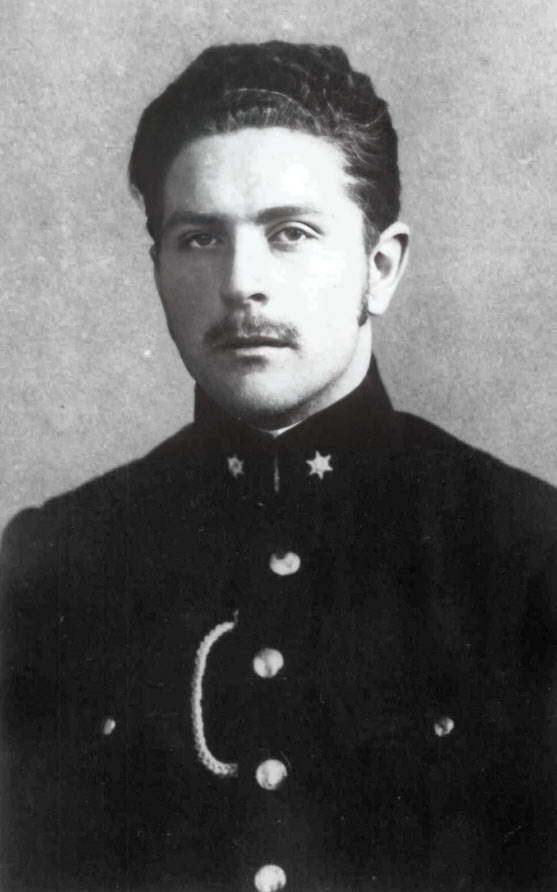
Ludwig Maitzen was a resistance fighter against the Dollfuß regime in German Austria and a Blood martyr of the National Socialist movement who was murdered due to the so-called July Putsch.
The chief constable and law student Ludwig Maitzen was sentenced to death and executed for his participation in the July putsch.
The trial against Otto Planetta and Franz Holzweber began on 30 July. At this speed, it was not possible and probably not desired to conduct the trial with even a modicum of due process of law or a proper defence. Undoubtedly, the Austrofascist regime wanted to demonstrate toughness and spare members of the government who had come under suspicion. Both Planetta and Holzweber were sentenced one day later and executed immediately afterwards. In the course of August, further trials were held and numerous death sentences were passed, eleven of which were carried out. Franz Leeb, Ludwig Maitzen, Josef Hackl, Erich Wohlraab and Ernst Feike were executed; Johann Domes, the leader of the RAVAG occupation was also executed; finally two National Socialists, Franz Saureis and Franz Unterberger, for the mere possession of explosives; furthermore Friedrich Wurnig, Rudolf Erlbacher and Franz Ebner.
The execution of Ludwig Maitzen was described by pastor Hans Rieger from Vienna, who shortly before had spoken to the wife of the condemned man, who had sent a petition for clemency for her husband:
At a run, Maitzen hurried through the long, sparsely lit corridor of the prison wing to the place of execution. We stepped out onto the gallows yard under the open sky. The corpses of the comrades hanged before Maitzen were already hanging on three posts, covered with sheets up to about the middle of their bodies. The fourth post was free for Maitzen. (...) The executioner climbed to his elevated position behind the post, the executioners held their victim on the left and right. (...) From the executioner’s position the command sounded: Up! And at the same moment the executioners lifted the condemned man up. The executioner threw the noose around his neck from behind and commanded: Ready! The servants let the heavy body slide downwards and pulled hard on the hanged man’s arms, while the executioner simultaneously held the dying man’s nose and mouth from behind. Unconsciousness was immediate and the head was immediately broken to the left. As the body continued to show signs of life for some time, the executioner climbed up the scaffold again at the doctor’s request and performed an uncontrollable manipulation on the dying man’s neck. The dying man’s face gave a last soft twitch - then the body stretched.
Fritz Stocker
(died 13 August 1934 in Pichl, Gleiming)
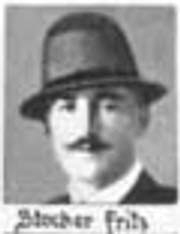
Fritz Stocker was a resistance fighter against the Dollfuß regime in German Austria and a Blood martyr of the National Socialist movement who died during the so-called July Putsch.
Erich Wohlrab [Wohlraab]
(*1908, died 13 August 1934 in Vienna)
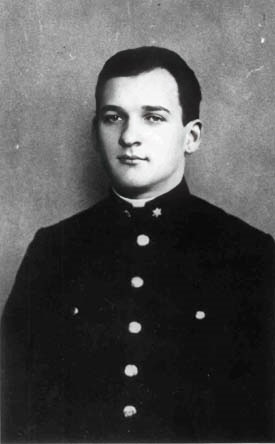
Erich Wohlrab [Wohlraab] was a resistance fighter against the Dollfuß regime in German Austria and a Blood martyr of the National Socialist movement who was murdered due to the so-called July Putsch.
Police guard Erich Wohlraab was sentenced to death and executed for his participation in the July putsch. His last words were: Heil Hitler!
The trial against Otto Planetta and Franz Holzweber began on 30 July. At this speed, it was not possible and probably not desired to conduct the trial with even a modicum of due process of law or a proper defence. Undoubtedly, the Austrofascist regime wanted to demonstrate toughness and spare members of the government who had come under suspicion. Both Planetta and Holzweber were sentenced one day later and executed immediately afterwards. In the course of August, further trials were held and numerous death sentences were passed, eleven of which were carried out. Franz Leeb, Ludwig Maitzen, Josef Hackl, Erich Wohlraab and Ernst Feike were executed; Johann Domes, the leader of the RAVAG occupation was also executed; finally two National Socialists, Franz Saureis and Franz Unterberger, for the mere possession of explosives; furthermore Friedrich Wurnig, Rudolf Erlbacher and Franz Ebner.
In Linz, the current Cremeristraße bore his name.
Johann [Johannes] [Hans] Domes
(*1901, died 18 August 1934 in Vienna)
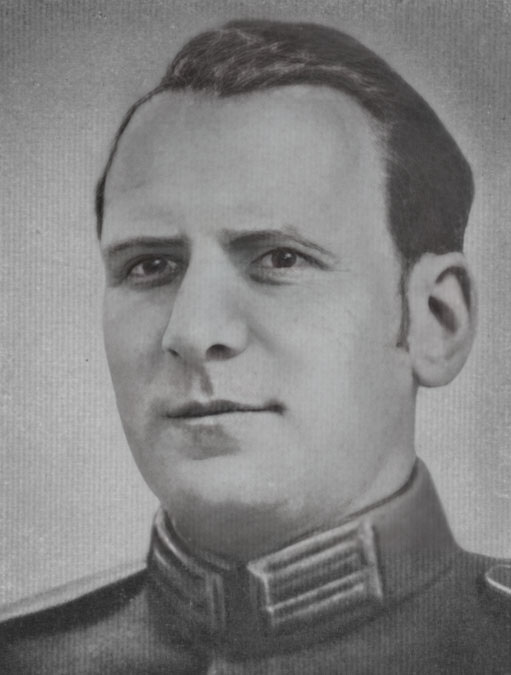
Johann [Johannes] [Hans] Domes was a resistance fighter against the Dollfuß regime in German Austria and a Blood martyr of the National Socialist movement, who was murdered due to the so-called July Putsch.
The clerk Johann Domes was sentenced to death and executed for his participation in the July putsch. The non-commissioned officer had previously been dismissed from the army because of his National Socialist convictions. He led the occupation of the RAVAG. Even at his execution he strode soldierly erect. His last words were a confession of his attitude:
I die for my beloved German people!
The trial against Otto Planetta and Franz Holzweber began on 30 July. At this speed, it was not possible and probably not desired to conduct the trial with even a modicum of due process of law or a proper defence. Undoubtedly, the Austrofascist regime wanted to demonstrate toughness and spare members of the government who had come under suspicion. Both Planetta and Holzweber were sentenced one day later and executed immediately afterwards. In the course of August, further trials were held and numerous death sentences were passed, eleven of which were carried out. Franz Leeb, Ludwig Maitzen, Josef Hackl, Erich Wohlraab and Ernst Feike were executed; Johann Domes, the leader of the RAVAG occupation was also executed; finally two National Socialists, Franz Saureis and Franz Unterberger, for the mere possession of explosives; furthermore Friedrich Wurnig, Rudolf Erlbacher and Franz Ebner.
In Linz, Domesstraße bore his name.
Franz Saureis
(*1904, died 20 August 1934 in Bad Ischl)

Franz Saureis was a resistance fighter against the Dollfuß regime in German Austria and a Blood martyr of the National Socialist movement who was murdered due to the so-called July Putsch.
The July riots of 1934 were concentrated in the Inner Salzkammergut in the municipalities of Bad Ischl, Goisern and Hall-statt as well as the outlying areas in the north, Laakirchen and Pinsdorf, and in the south Bad Aussee. According to a report in the Salzkammergut Zeitung, the insurgents advanced from St. Wolfgang and Lindau to Bad Ischl in motor vehicles provided by businessmen. The uprising was bloodily put down.
The trial against Otto Planetta and Franz Holzweber began on 30 July. At this speed, it was not possible and probably not desired to conduct the trial with even a modicum of due process of law or a proper defence. Undoubtedly, the Austrofascist regime wanted to demonstrate toughness and spare members of the government who had come under suspicion. Both Planetta and Holzweber were sentenced one day later and executed immediately afterwards. In the course of August, further trials were held and numerous death sentences were passed, eleven of which were carried out. Franz Leeb, Ludwig Maitzen, Josef Hackl, Erich Wohlraab and Ernst Feike were executed; Johann Domes, the leader of the RAVAG occupation was also executed; finally two National Socialists, Franz Saureis and Franz Unterberger, for the mere possession of explosives; furthermore Friedrich Wurnig, Rudolf Erlbacher and Franz Ebner.
The execution of the two farmhands Franz Saureis and Franz Unterberger from Bad Ischl caused great bitterness. Both had been arrested for possession of explosives and sentenced to death by hanging by a Viennese court martial. 2 kg of ammonite were found on them. The sentence was carried out on the same day, 20 August 1934.
To the clergyman who accompanied him on the way to the gallows Franz Saureis said:
And despite of everything, I remain what I was, a National Socialist until my last breath!
His last call was Heil Hitler!
A memorial stone was erected for Karl Traint in Lindau, a district of Bad Ischl, and in August 1938 Traint was given a grave of honour in the Ischl town cemetery together with Franz Saureis and Franz Unterberger, who were executed in 1934.
The current Pollheimerstrasse in Linz bore the honorary name Saureisstrasse.
Franz Unterberger
(*1907, died 20 August 1934 in Bad Ischl)
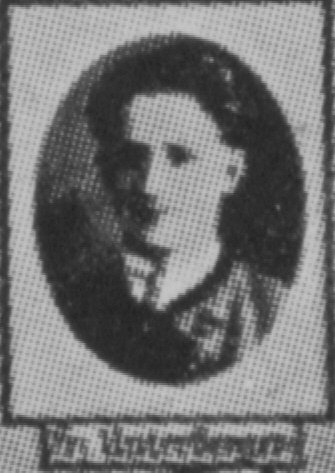
Franz Unterberger was a resistance fighter against the Dollfuß regime in German Austria and a Blood martyr of the National Socialist movement, who was murdered due to the so-called July Putsch.
The July riots of 1934 were concentrated in the Inner Salzkammergut in the municipalities of Bad Ischl, Goisern and Hallstatt as well as the outlying areas in the north, Laakirchen and Pinsdorf, and in the south Bad Aussee. According to a report in the Salzkammergut Zeitung, the insurgents advanced from St. Wolfgang and Lindau to Bad Ischl in motor vehicles provided by businessmen. The uprising was bloodily put down.
The trial against Otto Planetta and Franz Holzweber began on 30 July. At this speed, it was not possible and probably not desired to conduct the trial with even a modicum of due process of law or a proper defence. Undoubtedly, the Austrofascist regime wanted to demonstrate toughness and spare members of the government who had come under suspicion. Both Planetta and Holzweber were sentenced one day later and executed immediately afterwards. In the course of August, further trials were held and numerous death sentences were passed, eleven of which were carried out. Franz Leeb, Ludwig Maitzen, Josef Hackl, Erich Wohlraab and Ernst Feike were executed; Johann Domes, the leader of the RAVAG occupation was also executed; finally two National Socialists, Franz Saureis and Franz Unterberger, for the mere possession of explosives; furthermore Friedrich Wurnig, Rudolf Erlbacher and Franz Ebner.
The execution of the two farmhands Franz Saureis and Franz Unterberger from Bad Ischl caused great bitterness. Both had been arrested for possession of explosives and sentenced to death by hanging by a Viennese court martial. 2 kg of ammonite were found on them. Franz Unterberger had taken the ammonite and kept it out of love for Franz Saureis. The sentence was carried out on the same day, 20 August 1934.
A memorial stone was erected for Karl Traint in Lindau, a district of Bad Ischl, and in August 1938 Traint was given a grave of honour in the Ischl town cemetery together with Franz Saureis and Franz Unterberger, who were executed in 1934.
The current Losensteinerstraße in Linz bore the honorary name Unterbergerstraße.
Rudolf Erlbacher
(died 22 August 1934 in Steinach a. d. Enns)
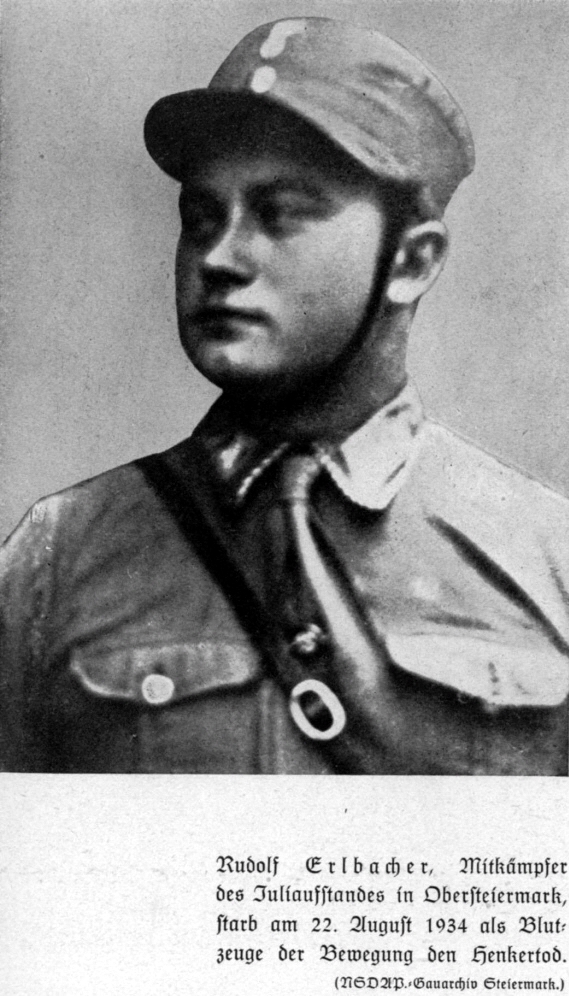
Rudolf Erlbacher was a resistance fighter against the Dollfuß regime in German Austria and a Blood martyr of the National Socialist movement.
The SA man Rudolf Erlbacher was sentenced to death for his participation in the so-called July putsch against the Dollfuß regime in German Austria and executed at the age of 28. His last words on the gallows were:
Heil Hitler! Heil Germany!
The July riots of 1934 were concentrated in the Inner Salzkammergut in the municipalities of Bad Ischl, Goisern and Hall-statt as well as the outlying areas in the north, Laakirchen and Pinsdorf, and in the south Bad Aussee. According to a report in the Salzkammergut Zeitung, the insurgents advanced from St. Wolfgang and Lindau to Bad Ischl in motor vehicles provided by businessmen. The uprising was bloodily put down.
The trial against Otto Planetta and Franz Holzweber began on 30 July. At this speed, it was not possible and probably not desired to conduct the trial with even a modicum of due process of law or a proper defence. Undoubtedly, the Austrofascist regime wanted to demonstrate toughness and spare members of the government who had come under suspicion. Both Planetta and Holzweber were sentenced one day later and executed immediately afterwards. In the course of August, further trials were held and numerous death sentences were passed, eleven of which were carried out. Franz Leeb, Ludwig Maitzen, Josef Hackl, Erich Wohlraab and Ernst Feike were executed; Johann Domes, the leader of the RAVAG occupation was also executed; finally two National Socialists, Franz Saureis and Franz Unterberger, for the mere possession of explosives; furthermore Friedrich Wurnig, Rudolf Erlbacher and Franz Ebner.
Rudolf Erlbacher wrote this last letter on death row:
Dear Mother and Brothers and Sisters!
Do not be sad that this fate has befallen me. I will gladly die for this great cause. You will experience it, that time for which I must go to my death.
Dearest Mother, do not be angry with me for having caused you this suffering, it will probably be determined that I may not live longer than 28 years.
Dear mother and brothers and sisters, whatever clothes I own at Moosbrugger’s in Hainach, including a bit of money, belongs to you and I ask you to give something to my daughter Trudi and to send greetings to everyone, including my father.
I am not sad, because I die a German man! Goodbye in eternity.
Your Rudi
Franz Ebner
(*1902, died 29 August 1934 in St. Gallen, Styria)
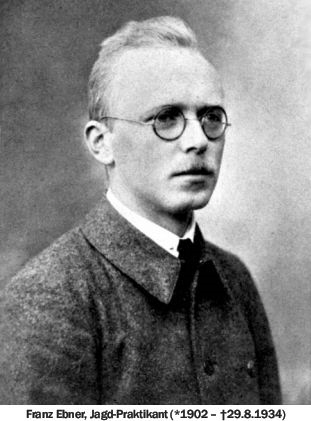
Franz Ebner was a resistance fighter against the Dollfuß regime in German Austria and a Blood martyr of the National Socialist movement who was murdered due to the so-called July Putsch.
The hunting trainee and SA man Franz Ebner was sentenced to death and executed for his participation in the July putsch. During the attempt to arrest the gendarmerie district inspector Franz Titz was accidentally shot. After the bloody suppression of the uprising, the wounded Franz Ebner first fled into the surrounding forests, but surrendered to the police on 14 August 1934. Surprisingly for him, the charge of murdering Franz Titz was brought against him. During the subsequent show trial he was charged with this on the basis of false testimony. Franz Ebner was asked by the public prosecutor why he had voluntarily turned himself in after almost three weeks. Ebner gave two reasons: On the one hand, he had wanted to protect his family, on the other hand, he had felt „partly“ responsible for what had happened. He had not known that he had been accused of the murder of police inspector Titz.
The trial against Otto Planetta and Franz Holzweber began on 30 July. At this speed, it was not possible and probably not desired to conduct the trial with even a modicum of due process of law or a proper defence. Undoubtedly, the Austrofascist regime wanted to demonstrate toughness and spare members of the government who had come under suspicion. Both Planetta and Holzweber were sentenced one day later and executed immediately afterwards. In the course of August, further trials were held and numerous death sentences were passed, eleven of which were carried out. Franz Leeb, Ludwig Maitzen, Josef Hackl, Erich Wohlraab and Ernst Feike were executed; Johann Domes, the leader of the RAVAG occupation was also executed; finally two National Socialists, Franz Saureis and Franz Unterberger, for the mere possession of explosives; furthermore Friedrich Wurnig, Rudolf Erlbacher and Franz Ebner.
In Linz, Ebnerstraße was named after him, in St. Gallen the main street was called Franz-Ebner-Straße.